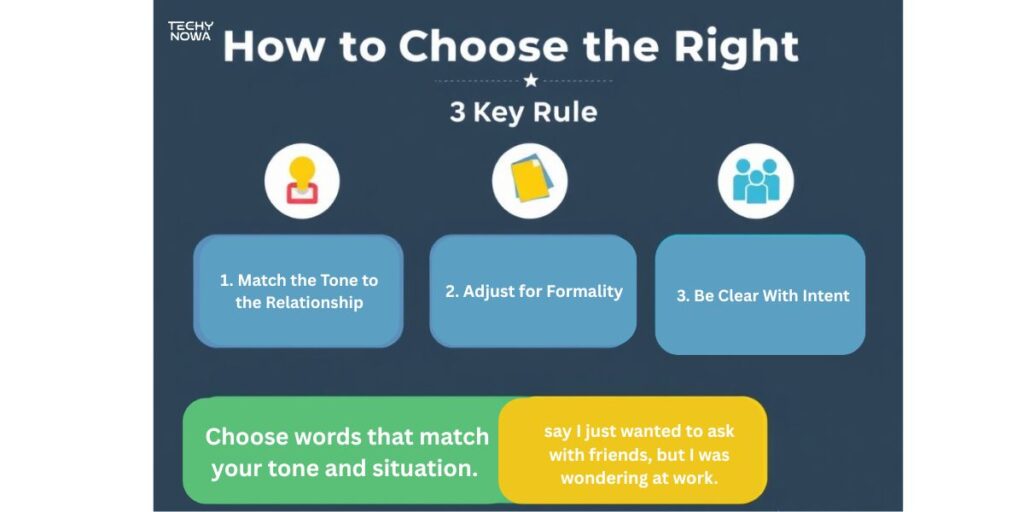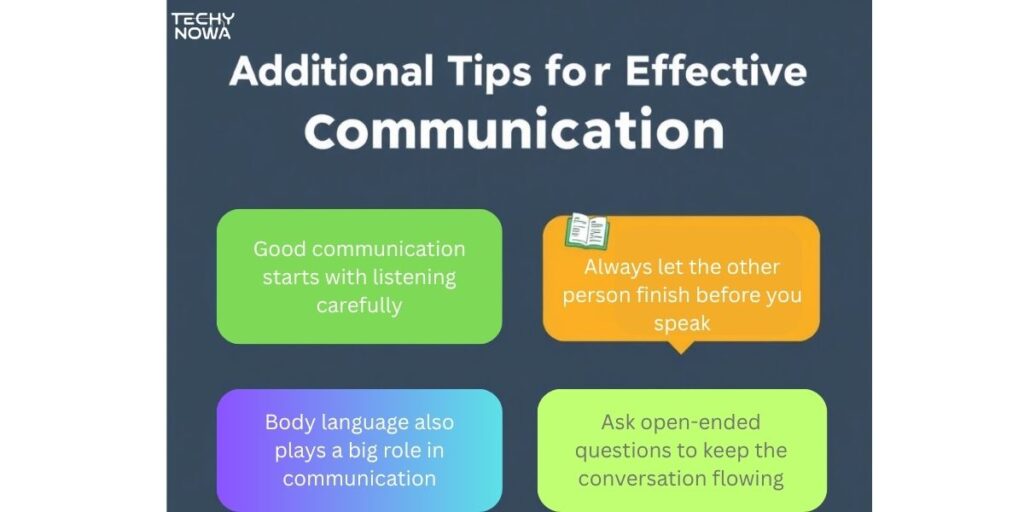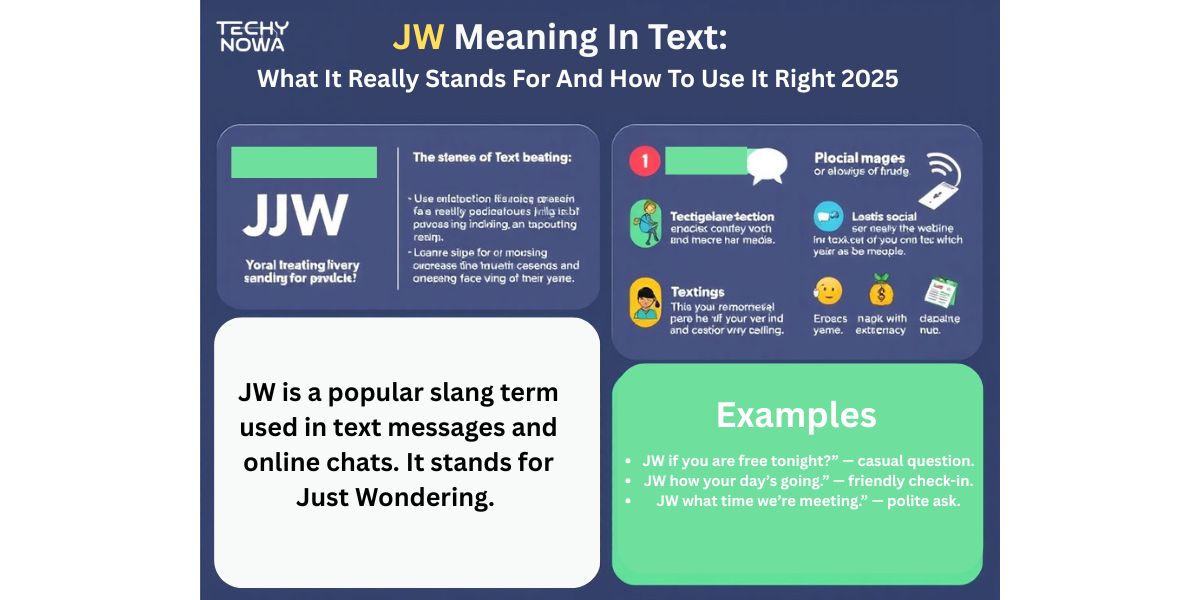JW is a popular slang term used in text messages and online chats. It stands for Just Wondering. People use it when they want to ask something casually or show curiosity. Understanding it helps you reply in the right tone. It is common on platforms like Snapchat, Instagram and WhatsApp. In this guide, we shall explain what it means and how to use it correctly in 2025.
Why Understanding “JW” Matters in Communication
It is important for clear communication. It shows when someone is being curious, not demanding. This helps you respond politely and naturally. Knowing its meaning also avoids confusion in chats. It keeps your tone friendly and respectful.
Using it correctly improves your digital conversations. It makes you sound thoughtful and casual at the same time. People feel more comfortable chatting with you. It also helps you connect better online. A simple “JW” can make your message feel warm and genuine.
Example:
- JW if you are free tonight?” — casual question.
- JW how your day’s going.” — friendly check-in.
- JW what time we’re meeting.” — polite ask.
The Core Meaning of “JW”
It simply means Just Wondering. People use it to ask a question without sounding too serious. It shows curiosity or interest in something. The tone is usually friendly and casual. For example, JW, are you free later? shows you are just asking, not insisting.
It helps keep conversations light and easy. It is often used when you want quick info or to start a chat. The phrase avoids sounding pushy or demanding. It is great for texting with friends or coworkers. For example, JW, did you watch that new show? sounds polite and relaxed.
Related guide: TM In Text Messages: Meaning, Usage, And Best Alternatives 2025
Common Situations Where “JW” Is Used
People use “JW” in many casual texting moments. It fits when asking a small question or checking plans. You might use it when curious about someone’s opinion. It also works when you don’t want to sound too direct. For example, JW, are you busy tonight? keeps the tone friendly.
When You Should Avoid Using “JW”
| Situation | Why to Avoid “JW” | Example |
| Formal emails or work chats | It sounds too casual | JW if you got my report → sounds unprofessional |
| Serious or emotional talks | It may seem uncaring | JW, are you okay? can sound too light |
| Talking to strangers | It may confuse them | They might not know the meaning |
| Academic or business writing | Slang is not suitable | Keep language clear and formal |
| When clarity matters | It can cause misunderstanding | Better to write Just wondering fully |
15 Alternatives to “JW” (Just Wondering) — With Usage and Tone Explained

There are many ways to say JW depending on the situation. Some sound more polite, while others feel casual or friendly. Using the right alternative helps you match the tone of your message easily.
1. I was just curious…
Used when asking lightly or showing interest.
Example: I was just curious if you finished the project.
2. I was wondering…
- Sounds polite and thoughtful.
- Example: I was wondering if you could help me tomorrow.
3. Would you happen to know…
- Great for polite or formal questions.
- Example: “Would you happen to know when the meeting starts?”
4. If you don’t mind me asking…
- Shows respect before asking something personal.
- Example: “If you don’t mind me asking, where do you work?”
5. Just wanted to ask…
- Simple and friendly tone.
- Example: “Just wanted to ask if you got my message.”
6. Out of curiosity…
- Used for casual or random questions.
- Example: “Out of curiosity, have you ever been to Japan?”
7. Mind if I ask…
- Shows politeness before questioning.
- Example: “Mind if I ask what time you are leaving?”
8. Could you let me know…
- Sounds respectful and clear.
- Example: “Could you let me know when you are available?”
9. Do you know if…
- Used to confirm or check information.
- Example: “Do you know if the shop is open today?”
10. Is there any update on…
- Often used in work or project settings.
- Example: “Is there any update on the report?”
11. Would it be alright if I asked…
- Very polite and gentle phrasing.
- Example: “Would it be alright if I asked about your plans?”
12. Just checking in to see…
- Sounds caring or professional.
- Example: “Just checking in to see how things are going.”
13. I hope it’s okay to ask…
- Shows kindness and caution.
- Example: “I hope it is okay to ask, are you doing alright?”
14. I’m interested to know…
- Shows curiosity in a polite way.
- Example: “I’m interested to know how you learned that skill.”
15. Could I ask something, if that’s alright?
- Soft and respectful question opener.
- Example: “Could I ask something, if that is alright with you?”
How to Choose the Right Alternative: 3 Key Rules

Choose words that match your tone and situation. Use polite phrases in formal chats and simple ones with friends. Always keep your message clear and respectful.
Related guide: EYP Meaning Slang: The Complete 2025 Guide To Its Usage, Definition & Alternatives
1. Match the Tone to the Relationship
Your tone should fit how close you are to the person. Use casual phrases with friends or family. Choose polite words when talking to coworkers or new people. It helps your message sound natural and kind. For example, say I just wanted to ask with friends, but I was wondering at work.
2. Adjust for Formality
Different situations need different levels of formality. In professional talks, keep your wording clear and respectful. Avoid slang or shortcuts in business messages. In casual chats, it is okay to use shorter forms. For example, say Could you let me know? instead of JW in emails.
3. Be Clear With Intent
Always make sure your question is easy to understand. Do not leave room for confusion or misread tone. Add context if needed to make your point clear. This helps others respond better and faster. For example, say Just checking in to see if you got my email instead of only JW.
Related guide: What Does RS Mean In Text? Complete Guide With Polite Alternatives 2025
Additional Tips for Effective Communication
Good communication starts with listening carefully. Always let the other person finish before you speak. Use simple and clear words to avoid confusion. Keep your tone friendly and respectful. For example, say I understand your point instead of arguing right away.

Body language also plays a big role in communication. Maintain eye contact to show confidence. Avoid crossing your arms, as it can seem defensive. Ask open-ended questions to keep the conversation flowing. For example, ask What do you think about this idea? to invite discussion.
Real-Life Examples: JW vs. Better Alternatives
Many people use JW to sound casual or polite when asking questions. For example, you might text JW if you are free tomorrow. It shows curiosity without pressure. Using it too often can sound lazy or unclear. It is better for friendly or informal chats.
In professional or formal messages, full phrases sound better. You could say, I was just wondering if you are available tomorrow. This sounds clearer and more respectful. Using full words shows effort and care. It’s best for emails or work-related messages.
My Experience Using “JW” in Chats
When I first saw “JW” in a chat, I was confused. My friend texted, “JW, are you free tonight?” and I didn’t know what it meant. Later, I learned it stands for “Just Wondering.” After that, I started using it to ask small questions politely. It made my messages sound more casual and friendly.
Over time, I noticed “JW” helps make conversations softer. It shows curiosity without sounding too direct. For example, I might say, “JW if you finished your project.” It is short, simple and easy to use. Now, I use it often in both friendly and casual chats.
Frequently Asked Questions
What does “JW” mean in texting?
It stands for Just Wondering. It is used to ask a question casually.
Is “JW” formal or informal?
It is informal and mostly used in casual chats or social media.
Can I use “JW” in professional messages?
It is better to avoid it in professional or work messages. Use full words like “Just wondering.”
Where is “JW” commonly used?
You will often see it on Snapchat, Instagram, WhatsApp or text messages.
What is the difference between “JW” and “JK”?
“JW” means “Just Wondering,” while “JK” means “Just Kidding.” They express different tones.
Can “JW” be misunderstood?
Yes, if the person does not know the meaning, they might get confused.
What are some examples of “JW” in a sentence?
“JW if you are coming to the party tonight.”
Conclusion
Understanding “JW” makes texting easier and clearer. It helps you ask questions in a polite way. You can use it to show curiosity without sounding too serious. Many people use it in daily chats and social apps. It is short, friendly and easy to remember. Learning it helps you communicate more smoothly online.
Using “JW” the right way shows good digital manners. It keeps your tone light and respectful in conversations. Whether texting friends or posting online, it fits well. Always use it when you want to ask something softly.








